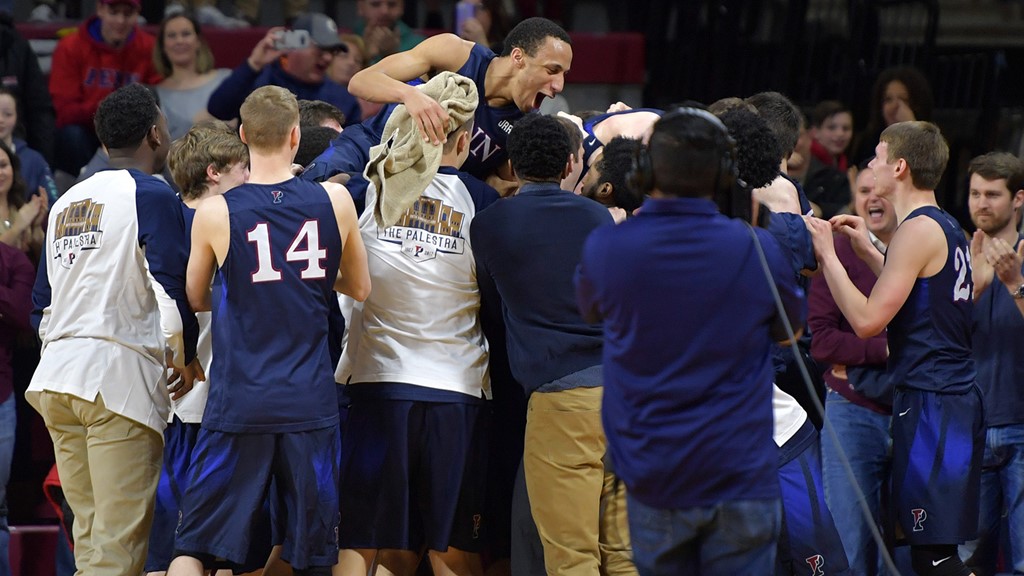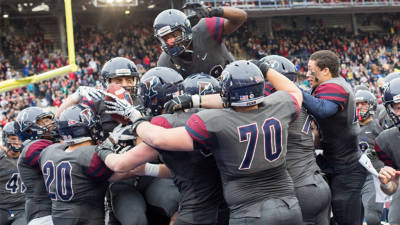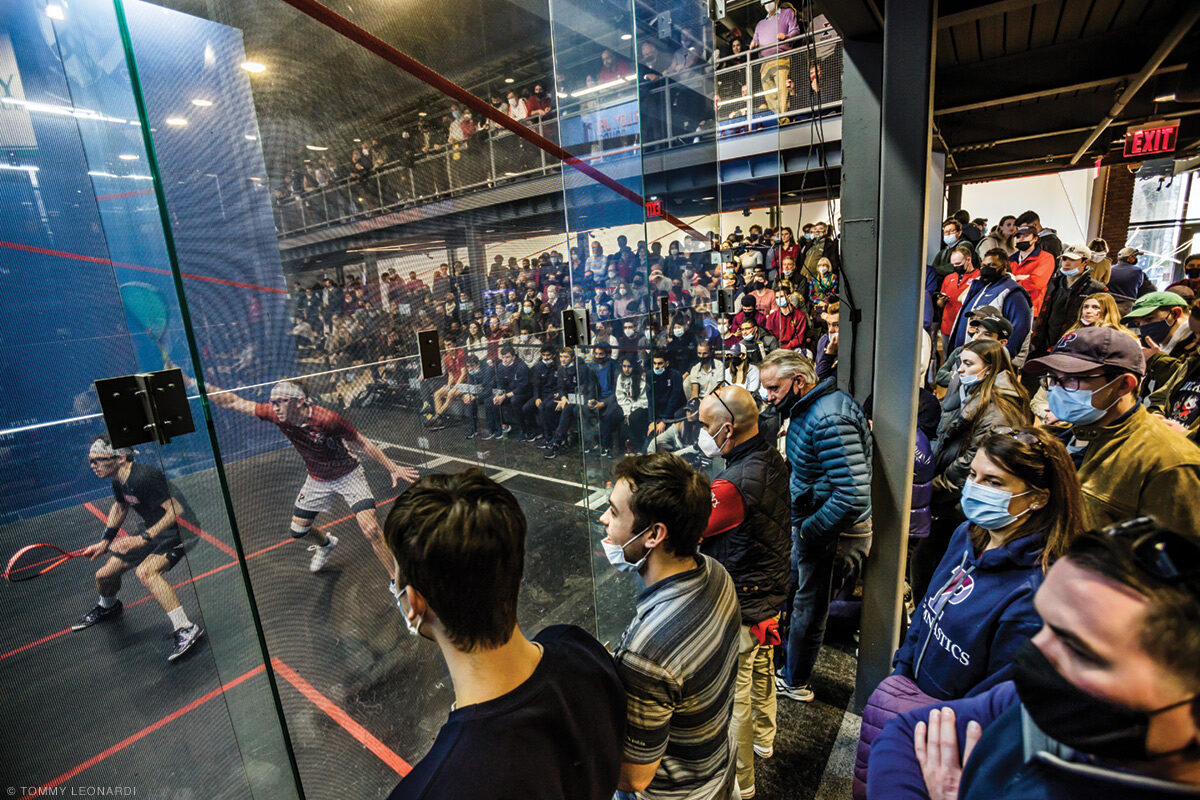
Led by a passionate alumnus head coach and an international roster exemplifying the modern University, the Penn men’s squash team enjoyed a historic season while drawing attention—and raucous cheers!—to a sport usually on the fringes of campus life.
By Dave Zeitlin | Photography by Tommy Leonardi C’89
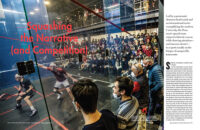
Saksham Choudhary couldn’t bear to watch.
As his teammate on the Penn men’s squash team, Nathan Kueh, played the final match of the national championship showdown pitting the Quakers against Harvard on February 20, Choudhary wandered over to an empty chair in the middle of the next court. He sat by himself, shielded from Kueh’s deciding match against Harvard’s Ido Burstein by a white wall smudged almost entirely black by rubber balls being repeatedly blasted against it. His only clues as to what was happening came from glancing up at the scoreboard—which was slowly moving in the wrong direction for the Quakers, who had been expected to polish off a perfect season and hoist their first Potter Cup trophy, given to the country’s top team of the “A” division of the College Squash Association (CSA) championships. Or by listening for the eruptions of sound behind him from the alumni, students, and other spectators that filled all corners of the recently renovated Penn Squash Center, some standing on chairs or hanging over the balcony to catch a view of the action.
“I was just thinking of all those practice sessions leading up to the tournament, all of the matches we had won together,” Choudhary says. “Everything just started coming back to me, like a flashback.”
Nearly 10,000 miles from home, Kueh had been in big spots before. The diminutive 19-year-old freshman from Malaysia—who would be named Ivy League Rookie of the Year and a second-team All-American after winning a “B Division” Molloy Cup individual title—knocked off a much older and taller player from Drexel in the national quarterfinals on Friday. And he followed that up with a dramatic come-from-behind win over a Yale opponent in Saturday’s semifinals, throwing his racquet in celebration as fans shouted his name.
But those matches both went the full five games (matches are played in a best-of-five game format, and games are won by the first player to secure 11 points), and the grueling weekend took a toll on Kueh’s shins. As the freshman uncharacteristically lost the first two games and fell behind in the third, Choudhary trudged from his solitary seat on the empty court to a bench just outside of it, both hands covering his face. He was joined there by Dillon Huang, a junior from California who not long before had electrified the crowd with a stirring rally to give Penn four victories on the day, level with Harvard’s four. Choudhary—a junior from Delhi, India—had done his part too, pushing Penn closer to the five wins needed to end Harvard’s two-year reign as national champions. But with the contest knotted at 4–4, it all came down to Kueh in the No. 6 slot (players from each team are seeded 1 through 9 based on their skill level).
“The one thing I’ll always remember is I told Nathan right before, ‘There’s no one that we would rather have in this position,’” Penn head coach Gilly Lane C’07 G’14 LPS’20 says. “And I said, ‘Regardless of what happens, we’re going to have your back.’”
The match—and the tournament—ended in heartbreak for the Quakers as Kueh lost to Burstein in three games. As Harvard celebrated another championship, Choudhary and Huang did not move from their spots on the bench, their hands still covering their faces, until Lane came over to hug them.
“We’ll be back,” their coach told them and a few other players who had gathered there. “Keep your heads up. This is the best team that’s ever been at this school. I’ve never been this proud in my entire life.”
Then he added, “I love you all so much.”
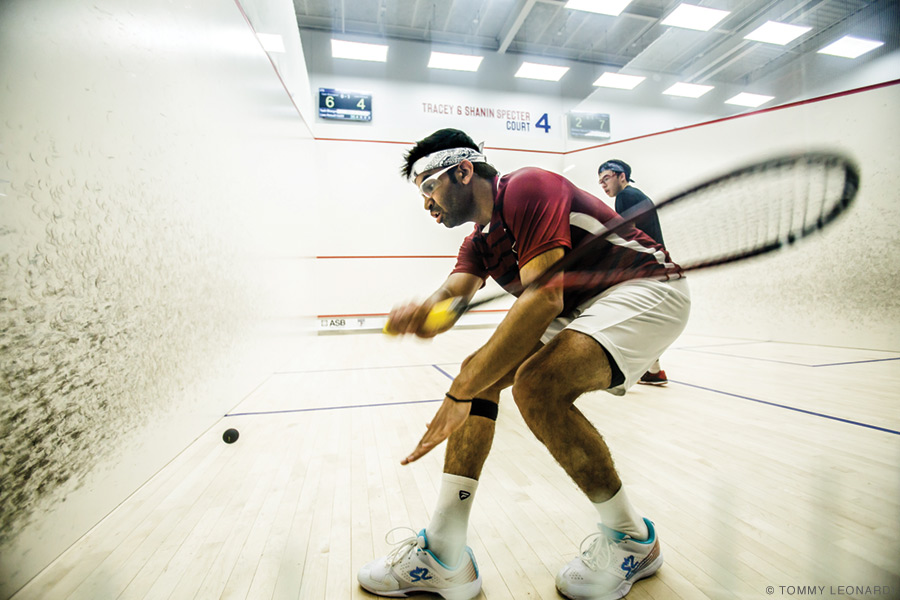
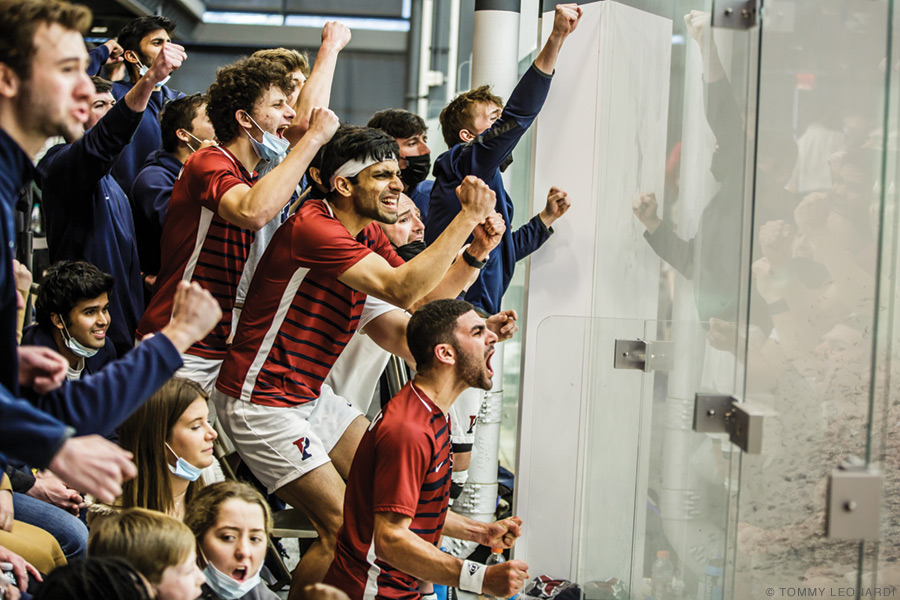
“Everyone’s been like, ‘You say love a lot.’”
It’s 10 days after the national tournament, and Lane is sitting inside a quieter Penn Squash Center. He’s in a reflective mood, scrolling through photos on his computer, smiling at the celebration shots but thinking he might display, for motivation, one in which his players look distraught after the final loss.
“I’m like, ‘I actually do love them. I care for them, and I want them to have the greatest experience in the world,’” the head coach continues. “There are certain groups that are special, and this year’s group was just so special. And so for them to be able to play in that atmosphere was just awesome.”
Lane and the players had a feeling this team could do special things. The Quakers had reached their first Potter Cup final in 2019–20, finishing as national runners-up. After the 2020–21 season was canceled due to the pandemic, Andrew Douglas C’21 LPS’22 (the only three-time All-American in program history) and Yash Bhargava C’21 SPP’22 (the program’s all-time wins leader) both took advantage of the Ivy League’s one-time exception to regain one more year of athletic eligibility by attending graduate school at Penn. As grad students, Douglas and Bhargava joined seniors Aly Abou Eleinen and James Flynn and juniors Huang and Choudhary to form a veteran core that had the Quakers ranked No. 1 ahead of the 2021–22 campaign—a spot they maintained throughout the season in dominant fashion. Of their first nine matches in November and December, they won seven by a 9–0 margin and the other two 8–1. In January and February, they knocked off perennial squash powers Harvard, Princeton, and Trinity and then polished off their first-ever undefeated regular season by routing Cornell to capture the program’s first outright Ivy League title since 1969.
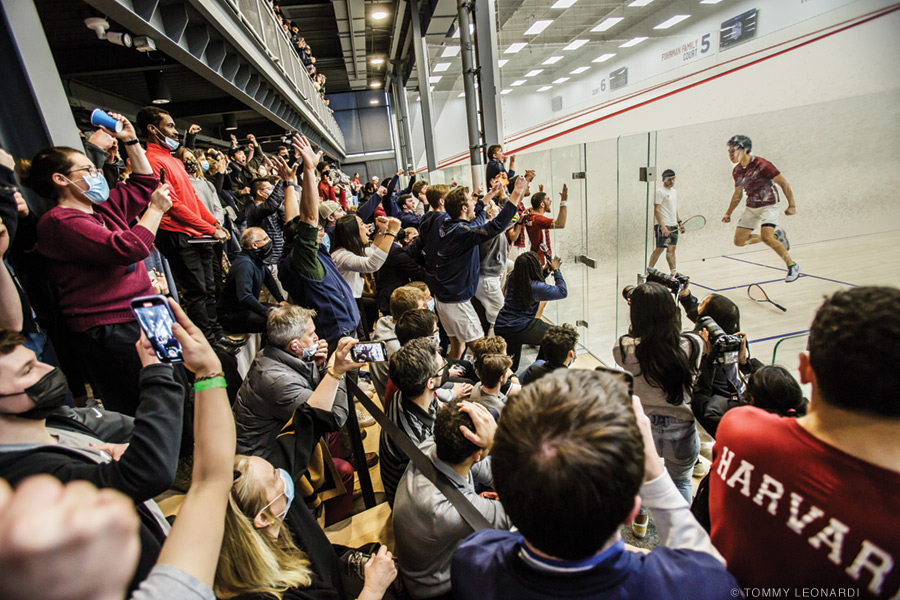
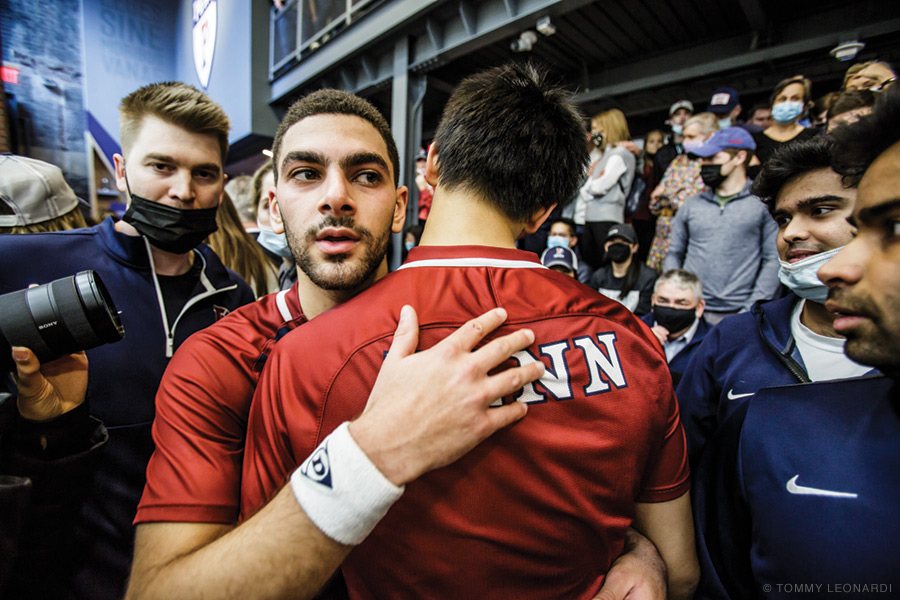
All the while, a buzz was building on Penn’s campus for a team typically on the periphery of university life. “As we were winning throughout the season and had the No. 1 ranking in the country, people started to get more interested in the sport,” says Eleinen, who along with Douglas was named a first-team All-American. “And we started to get more people coming to our matches.”
By the time Penn hosted the Potter Cup, COVID restrictions had eased, offering students and alumni the opportunity to see the top-ranked team compete for the program’s first national title. Former Penn squash players spanning more than 50 years arrived to cheer them on, including CSA Hall of Famer Palmer Page W’72. So did fans you might typically see at the Palestra, making it as loud, at times, as the boisterous gym next door. Even members of the men’s basketball team showed up on Sunday, about 15 hours after a buzzer-beating win over Brown in Providence, Rhode Island.
“The whole basketball team watching a squash match—who would have ever thought that?” laughs Doug Kramer W’92, head of the Penn Squash alumni board. A former Penn squash captain from 1990 to 1992, Kramer had helped organize the facility renovation project made possible by roughly $20 million in alumni donations. When the new Penn Squash Center opened in November 2019 (it had previously been called Ringe Squash Courts, and had been the team’s home since 1958), the upgrades included improved seating and viewing areas on the lower and mezzanine levels [“Sports,” Nov|Dec 2019]. “Our facility is unquestionably the best facility in college squash,” Kramer says. “When it was designed, a lot of thought and care was put into how spectators would look at the sport and how we would create the atmosphere that you saw.”
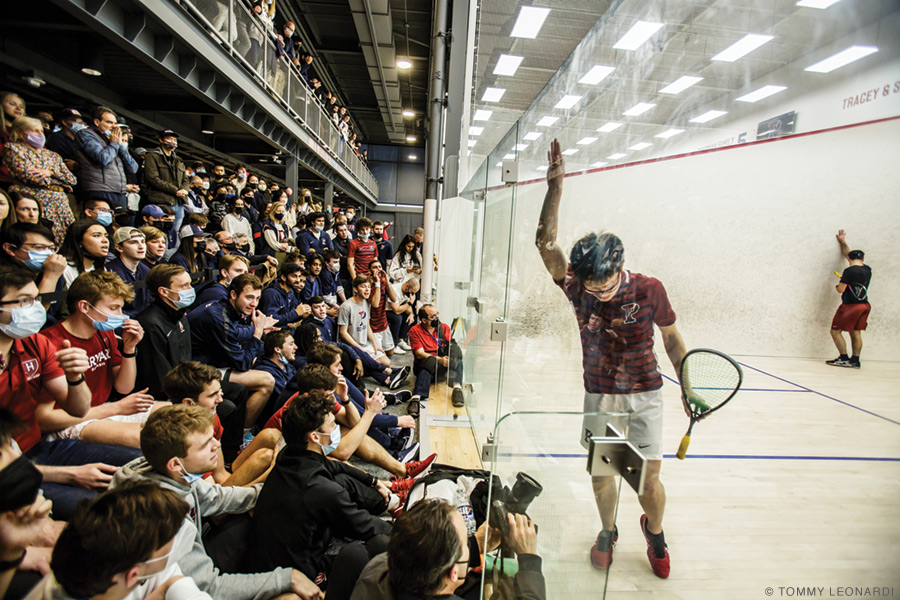
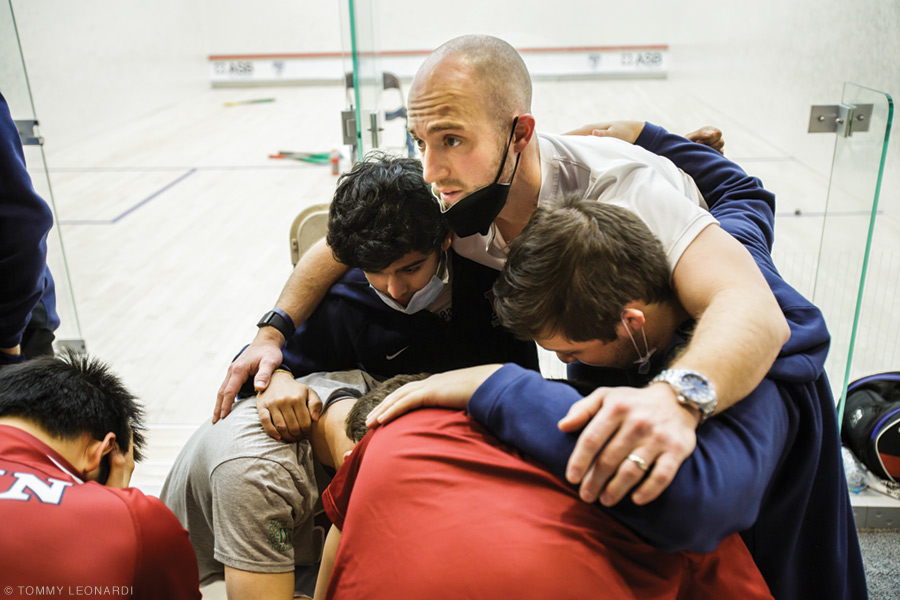
Kramer adds that first-time squash watchers are generally “surprised how exciting it is and how special the athletes are”—which is only bolstered by the fact that spectators can be “right on top of the action,” notes Lane. “You don’t need a VIP ticket to sit up front.” (Penn and the CSA didn’t charge for entry at all.) The response from the roughly 2,000 fans who attended the Potter Cup over the course of the weekend seemed to be equal parts excitement and awe, as they got to enjoy a fast-paced sport in which the athletes alternate striking a small rubber ball against a wall, hoping to find the right angles to confuse or tire out their opponent so they can’t hit a return shot. “People were in love with the sport after,” Eleinen says. “They were amazed. Everyone’s been hitting me up because they want me to teach them how to play.”
By the time Kueh—who at one point during the weekend was involved in a rally that lasted nearly five minutes—entered the court for the deciding match Sunday, the noise was deafening inside the building. “I think everyone that was there will agree that it was the best atmosphere that we’ve ever played squash in—by a lot,” Douglas says.
“I’ve played professional squash all over the world, and this was the best squash event that I’ve ever been a part of,” Lane adds. “I mean, when another coach told me that it was one of the top sporting events he’s ever been to at Penn, that was pretty awesome.”
Growing up outside of Philadelphia, Lane never dreamed of playing pro squash. He enjoyed the racquet sport, but more as a way to have fun with his father on winter weekend mornings at the Philadelphia Cricket Club. It wasn’t until a knee injury derailed his soccer career that he realized squash gave him the best chance to play a sport in college. And Penn, one of about 30 schools to offer varsity squash, proved to be the best place for him to do it.
Lane still wasn’t thinking of turning pro when he arrived on campus in the fall of 2013. But he brought with him a tenacity and competitiveness forged through years of playing team sports. “Gilly had amazing energy,” says his former teammate Jacob Himmelrich C’06, “and he was immediately great to have on the team.” Well, almost immediately. During Lane’s first practice as a freshman, Himmelrich recalls getting into “a little tussle” with the kid whose confidence bordered on cockiness. “But then we were fast friends quickly thereafter,” says Himmelrich.
The results speak for themselves, as Lane earned All-America, All-Ivy, and team MVP honors all four years at Penn, while serving as captain as a junior and a senior. Around then, he started thinking about trying to join the Professional Squash Association (PSA) after graduation, which usually drew quizzical stares from Penn peers headed to hedge funds or law school. But he was encouraged by his close friends, including housemates Mark Zoller C’07 and Danny Cepero C’07 (who turned pro, in basketball and soccer, respectively), and he moved to Amsterdam in January of 2008 to begin training and playing in tournaments across Europe.
Over the next five years, he won three PSA titles, reached eight PSA finals, and ascended as high as 48 in the world rankings before a degenerative disk in his back cut his career short. Just as playing through pain was difficult, so was living abroad while trying to make ends meet in a sport that’s not exactly lucrative. But “being on the road toughened me up,” Lane says. “It made me stronger. It made me handle adversity a little bit more.” It also pushed him to look for other pathways in the squash world, returning to Philadelphia to work as a volunteer assistant at Drexel and give lessons while still on tour. In 2013, he rejoined the Penn squash programs as an assistant coach under Jack Wyant, the director of squash and head coach of the women’s squash team, before being named head coach of the men’s program three years later. Lane credits Wyant, who’s been at Penn for nearly two decades, for “being incredible during this whole ride. He saw my passion for the program and how much I loved working here and helped me move up the totem pole pretty quickly.”
As a young head coach who had “always liked building things,” Lane was excited to put a team together, piece by piece. And the best way to do so, he thought, was to venture back abroad and lure the most talented international players to Penn—something the men’s team hadn’t done as much during his own playing days but had helped Penn’s national-caliber women’s squash team find success. “The great thing about recruiting to your alma mater is that you never have to lie,” says Lane, who sold recruits on his favorite things about Penn, the new-and-improved squash facility and the proximity of other quality courts, and the opportunity to go from the college ranks to the pro circuit. His upbeat and gregarious nature didn’t hurt either. As Himmelrich, who’s noticed the vast upgrades in recruiting, puts it: “Gilly has such an infectious personality that anyone who spends time with him on a squash court wants to play more squash. He makes it fun.”
Lane’s first big international recruit was an Egyptian named Marwan Mahmoud C’18 (who tragically passed away in 2020). That “laid the groundwork,” Lane says, for others to follow—like Eleinen, who also hails from Egypt, a squash hotbed that produces many of the world’s top players. “It’s hard because Harvard and Princeton have such a big name, so they attract a lot of international players,” says Eleinen, whose older brother played at Harvard. “But right now, we’ve proven to the world that we’re just as good as those guys. When international players started coming to Penn, they saw how great the school is, how great the program is. People now know about us and want to come play for us.”
Lane, who calls international recruiting “the coolest part of the job,” brought together a team for the 2021–22 season that consisted of student-athletes from Egypt, India, Malaysia, England, Canada, and the US. “And these kids teach me something new every day—whether it’s food, whether it’s language, whether it’s family values, or celebrating certain holidays,” he says. “I loved all of my teammates, but we all came from the same background.”
More than widening the talent pool to bring the program to the next level, the squad’s international makeup is also a microcosm of a diverse and multicultural university like Penn—and one reason, perhaps, why much of the campus rallied behind them this season. “I think this team represents everything that this university’s about,” Lane says. “I really do.”
As the Omicron variant reared its ugly head this past winter, players on the Penn men’s squash team made a pact: to avoid getting COVID-19 and derailing their perfect season, they wouldn’t see anybody else but their teammates, as much as possible. For the eight team members who lived in the same off-campus house, that meant watching a lot of movies together and playing video games like FIFA or board games like Catan. “We tried to get as creative as possible without seeing people from the outside,” Eleinen says. “As hard as it was, it was really fun—because we were doing it together.” They talked so much and ate so many meals together that invariably each of their own cultures and customs from their native countries were shared. “Literally you sit down with people from all over the world,” Eleinen adds. “Every day you pick up on things. Accents, food, music—just everything.”
The squash team’s diversity is what drew Choudhary to Penn. Considering that most of his family went to the University of Delhi, coming to the US for college was an unconventional choice. But his parents “fell in love with Philadelphia” when they arrived for his freshman year in the fall of 2019, and “from day one, I felt at home,” says Choudhary, who has yet to lose a regular-season match in two seasons. He credits Lane for helping make it a smooth transition for the international students, many of whom the coach has invited over to his parents’ house for Thanksgiving. “He just takes that extra step in ensuring everyone on the team feels comfortable,” Choudhary adds.
“Some guys come to Penn having never seen it in person. That’s a scary, scary thing,” says Lane, adding that a key team-building component is the “upperclassmen taking care of the younger guys who are in the same situation they were in as freshmen.” That was especially helpful for Kueh, who moved across the world during a pandemic. Choudhary laughs that “the big revelation” during a Spring Break trip several players took to Cabo San Lucas, Mexico, after the season was that the freshman from Malaysia is “not quiet anymore.”
“It’s so important to make sure the freshmen are welcome,” says Eleinen. “It goes a long way, especially if they’re international, because the quicker they get transitioned and used to the team the better it is for everyone.” Eleinen adds that he expects Kueh “to be one of the best players in college squash” by the time he’s a senior. And along with Choudhary and Huang, Kueh and fellow freshman Roger Baddour of Egypt will join forces with sophomore Nick Spizzirri (whose surprising win over Harvard during the Potter Cup had Lane banging on the glass in celebration) to form a nucleus that should have the Quakers competing for a national title once again. “I believe we can certainly win it all next year,” Choudhary says. “Our mindset will be the same: to win every match and finish what James, Aly, Andrew, and all of these guys started. We’re gonna win it and we’re gonna win it for them.”
Lane’s goals go beyond a national championship. In his role as a CSA board member, he’s trying to push for more colleges to turn their club squash teams into varsity teams to increase competitiveness and create more parity. (Although Penn has a long history in squash dating back to 1935, Harvard, Princeton, and Trinity have had a stranglehold on winning championships.) He’d also like to see more kids have access to a sport that’s traditionally been viewed as an expensive “country club sport,” pointing to grassroots urban outreach initiatives undertaken at the Arlen Specter US Squash Center next door on Drexel’s campus. “We’re putting racquets in people’s hands that didn’t have a chance before,” he says. “That’s huge.”
Between the Specter Center (where all nine Penn starters competed and won matches at this year’s CSA Individual Championships in March) and the Penn and Drexel courts, University City has “become the epicenter of squash in the United States,” Lane notes. That means that the Quakers should have a “strategic advantage” in positioning themselves as a national powerhouse, Kramer says. “For Penn squash, the best is yet to come. The program has great momentum.”
It also benefits someone like Douglas, who doesn’t have to go far to continue his squash career. He currently plans to squeeze in professional squash around a regular job, training at the Specter Center once before 9 a.m. and once more in the afternoon.
Eleinen also plans to play professional squash after graduating in May. And he’s excited to embark on that journey with a Penn teammate (and perhaps cross paths with Melissa Alves C’18, who’s been enjoying success on the women’s tour). “It’s definitely good to have someone else doing this and knowing you’re not alone,” Eleinen says. Yet it seems he and Douglas—“probably the two best players to ever play here,” according to Lane—will approach the pro game differently.
While Eleinen is excited for the “buzz of traveling around playing tournaments and meeting new people and trying to improve my world ranking,” Douglas isn’t as sure if he can harness the same kind of energy he had at Penn, where an individual sport always felt like more of a team endeavor. His final match of the Potter Cup had a devastating finish, as Harvard’s No. 1 Victor Crouin survived two match balls and a controversial call from an official to win in five games. But the electricity from the crowd was unforgettable, giving Douglas the adrenaline rush he needed to push one of the best players in the world to the brink and, in many ways, justifying his decision to return to Penn as a graduate student at Fels after having been “pretty close to quitting” the sport during the pandemic.
Days after that match, Douglas was invited to compete in the Windy City Open, a major PSA tournament in Chicago. “I’m usually really up for those matches,” he says. “I enjoy the opportunity to play against real pros. But as I got to the match, and there were like 10 people in the crowd, I was like, Do I want to win? Sure, it would be nice to win. But do I really want to win?I just don’t have as much of the internal drive to win at all costs. When I was playing for the team, there was a reason for it. There was a purpose. And that is what I will 100 percent miss the most.”
Pausing to think more about his future—how long it will last, how it will be remembered—he continues with more certainty: “I undoubtedly know that college squash at Penn will have been the greatest squash experience of my life.”


